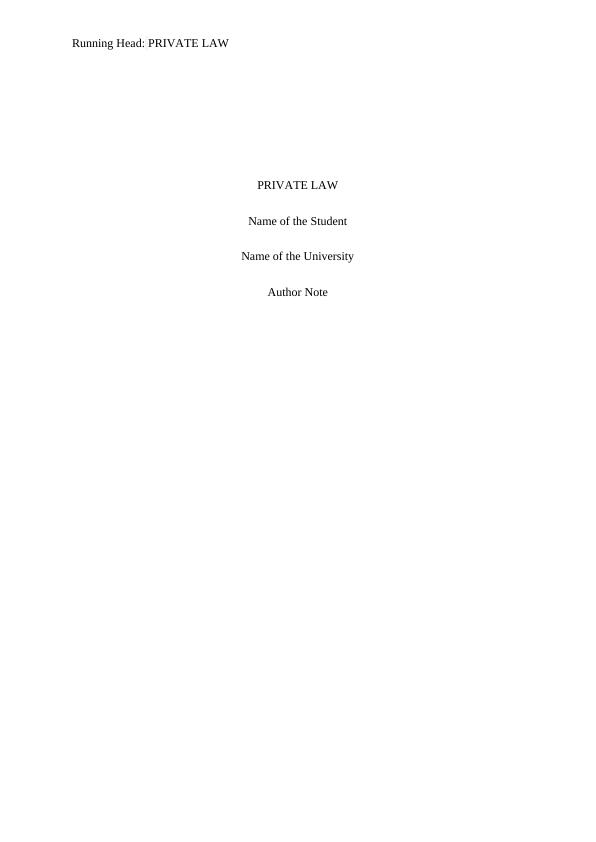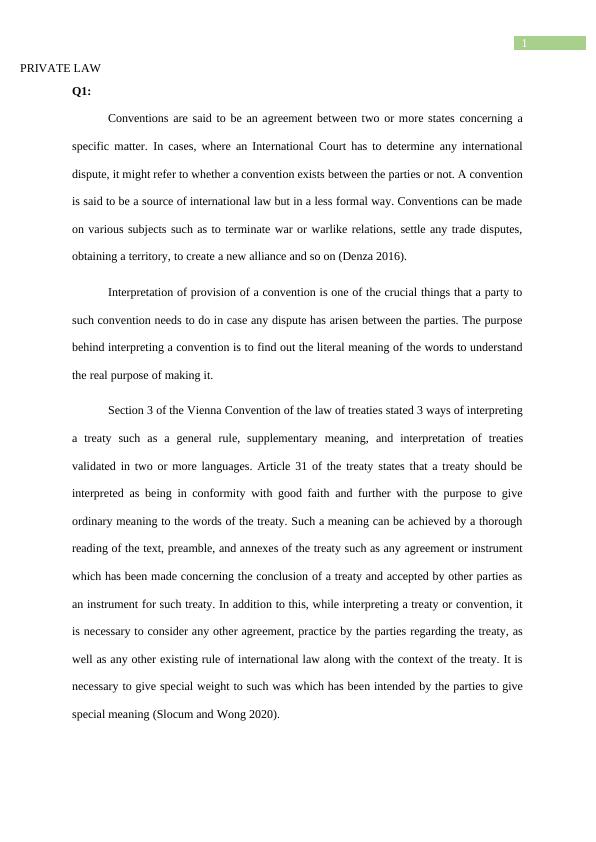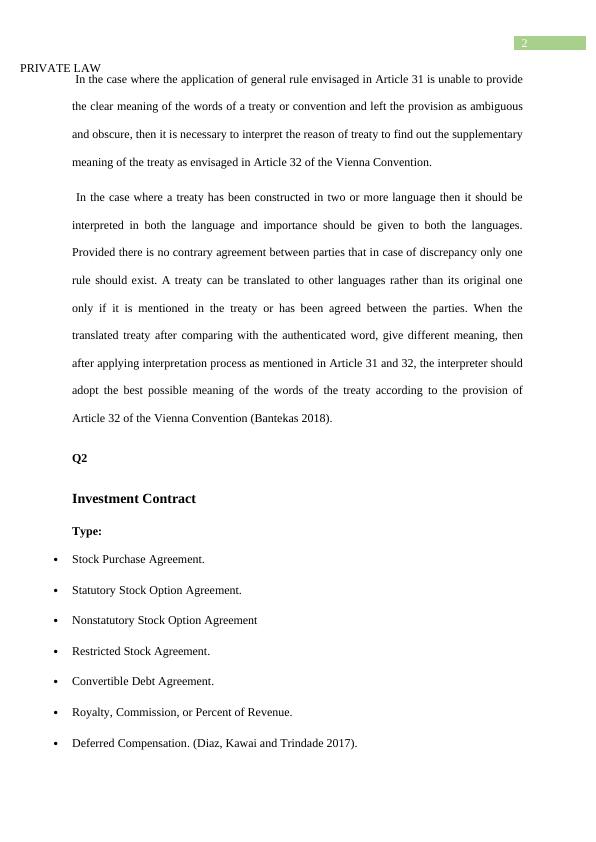Private Law | Assignment-1
Added on 2022-09-22
6 Pages1106 Words17 Views
Running Head: PRIVATE LAW
PRIVATE LAW
Name of the Student
Name of the University
Author Note
PRIVATE LAW
Name of the Student
Name of the University
Author Note

1
PRIVATE LAW
Q1:
Conventions are said to be an agreement between two or more states concerning a
specific matter. In cases, where an International Court has to determine any international
dispute, it might refer to whether a convention exists between the parties or not. A convention
is said to be a source of international law but in a less formal way. Conventions can be made
on various subjects such as to terminate war or warlike relations, settle any trade disputes,
obtaining a territory, to create a new alliance and so on (Denza 2016).
Interpretation of provision of a convention is one of the crucial things that a party to
such convention needs to do in case any dispute has arisen between the parties. The purpose
behind interpreting a convention is to find out the literal meaning of the words to understand
the real purpose of making it.
Section 3 of the Vienna Convention of the law of treaties stated 3 ways of interpreting
a treaty such as a general rule, supplementary meaning, and interpretation of treaties
validated in two or more languages. Article 31 of the treaty states that a treaty should be
interpreted as being in conformity with good faith and further with the purpose to give
ordinary meaning to the words of the treaty. Such a meaning can be achieved by a thorough
reading of the text, preamble, and annexes of the treaty such as any agreement or instrument
which has been made concerning the conclusion of a treaty and accepted by other parties as
an instrument for such treaty. In addition to this, while interpreting a treaty or convention, it
is necessary to consider any other agreement, practice by the parties regarding the treaty, as
well as any other existing rule of international law along with the context of the treaty. It is
necessary to give special weight to such was which has been intended by the parties to give
special meaning (Slocum and Wong 2020).
PRIVATE LAW
Q1:
Conventions are said to be an agreement between two or more states concerning a
specific matter. In cases, where an International Court has to determine any international
dispute, it might refer to whether a convention exists between the parties or not. A convention
is said to be a source of international law but in a less formal way. Conventions can be made
on various subjects such as to terminate war or warlike relations, settle any trade disputes,
obtaining a territory, to create a new alliance and so on (Denza 2016).
Interpretation of provision of a convention is one of the crucial things that a party to
such convention needs to do in case any dispute has arisen between the parties. The purpose
behind interpreting a convention is to find out the literal meaning of the words to understand
the real purpose of making it.
Section 3 of the Vienna Convention of the law of treaties stated 3 ways of interpreting
a treaty such as a general rule, supplementary meaning, and interpretation of treaties
validated in two or more languages. Article 31 of the treaty states that a treaty should be
interpreted as being in conformity with good faith and further with the purpose to give
ordinary meaning to the words of the treaty. Such a meaning can be achieved by a thorough
reading of the text, preamble, and annexes of the treaty such as any agreement or instrument
which has been made concerning the conclusion of a treaty and accepted by other parties as
an instrument for such treaty. In addition to this, while interpreting a treaty or convention, it
is necessary to consider any other agreement, practice by the parties regarding the treaty, as
well as any other existing rule of international law along with the context of the treaty. It is
necessary to give special weight to such was which has been intended by the parties to give
special meaning (Slocum and Wong 2020).

2
PRIVATE LAW
In the case where the application of general rule envisaged in Article 31 is unable to provide
the clear meaning of the words of a treaty or convention and left the provision as ambiguous
and obscure, then it is necessary to interpret the reason of treaty to find out the supplementary
meaning of the treaty as envisaged in Article 32 of the Vienna Convention.
In the case where a treaty has been constructed in two or more language then it should be
interpreted in both the language and importance should be given to both the languages.
Provided there is no contrary agreement between parties that in case of discrepancy only one
rule should exist. A treaty can be translated to other languages rather than its original one
only if it is mentioned in the treaty or has been agreed between the parties. When the
translated treaty after comparing with the authenticated word, give different meaning, then
after applying interpretation process as mentioned in Article 31 and 32, the interpreter should
adopt the best possible meaning of the words of the treaty according to the provision of
Article 32 of the Vienna Convention (Bantekas 2018).
Q2
Investment Contract
Type:
Stock Purchase Agreement.
Statutory Stock Option Agreement.
Nonstatutory Stock Option Agreement
Restricted Stock Agreement.
Convertible Debt Agreement.
Royalty, Commission, or Percent of Revenue.
Deferred Compensation. (Diaz, Kawai and Trindade 2017).
PRIVATE LAW
In the case where the application of general rule envisaged in Article 31 is unable to provide
the clear meaning of the words of a treaty or convention and left the provision as ambiguous
and obscure, then it is necessary to interpret the reason of treaty to find out the supplementary
meaning of the treaty as envisaged in Article 32 of the Vienna Convention.
In the case where a treaty has been constructed in two or more language then it should be
interpreted in both the language and importance should be given to both the languages.
Provided there is no contrary agreement between parties that in case of discrepancy only one
rule should exist. A treaty can be translated to other languages rather than its original one
only if it is mentioned in the treaty or has been agreed between the parties. When the
translated treaty after comparing with the authenticated word, give different meaning, then
after applying interpretation process as mentioned in Article 31 and 32, the interpreter should
adopt the best possible meaning of the words of the treaty according to the provision of
Article 32 of the Vienna Convention (Bantekas 2018).
Q2
Investment Contract
Type:
Stock Purchase Agreement.
Statutory Stock Option Agreement.
Nonstatutory Stock Option Agreement
Restricted Stock Agreement.
Convertible Debt Agreement.
Royalty, Commission, or Percent of Revenue.
Deferred Compensation. (Diaz, Kawai and Trindade 2017).

End of preview
Want to access all the pages? Upload your documents or become a member.
Related Documents
International Law Assignment PDFlg...
|7
|2434
|155
The Formation of International Treatieslg...
|15
|2655
|313
National Law in New Zealandlg...
|9
|2200
|56
Public International Law: Interpretation of Treaties and Article 31(3) (c) of VCLTlg...
|16
|4737
|146
Public International Law PDFlg...
|15
|4843
|54
International Sales of Goods Discussion 2022lg...
|4
|459
|17
